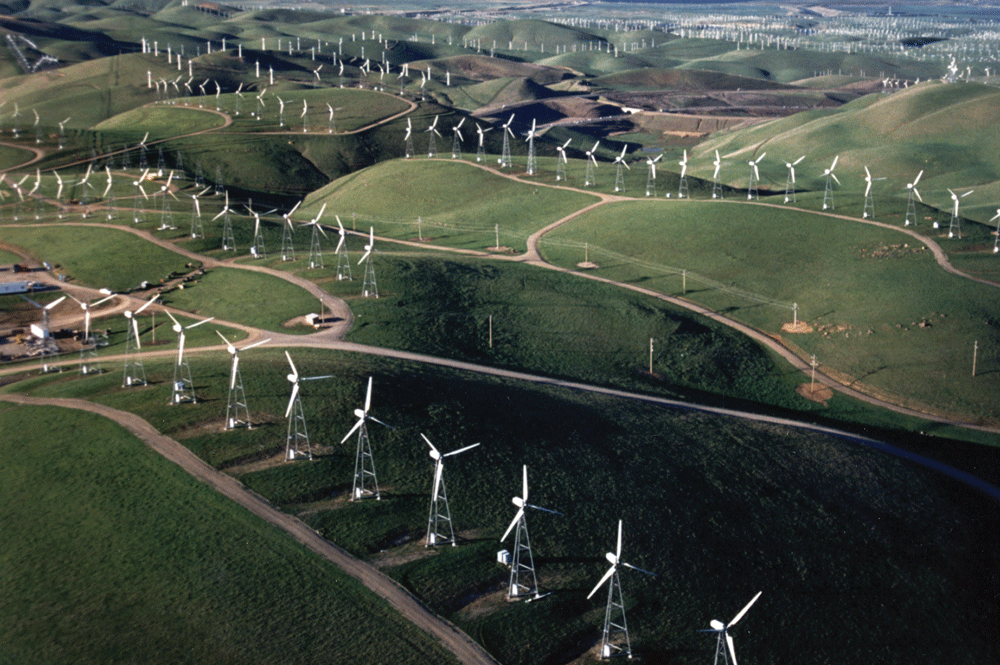One of the US’s oldest and most controversial wind farms may have finished operations. Altamont Winds Inc (AWI), one of four operators in California’s iconic Altamont Pass, has shut down its 800-plus turbines — a routine requirement from 1 November to 15 February to protect endangered birds, such as golden eagles, during the time when they are most active.
But it appears unlikely they will be restarted next year, and no decision has yet been made on repowering the project.
Rick Koebbe, president of PowerWorks Inc, AWI’s owner, had made no comment, nor responded to phone calls or emails in November requesting information on reports that the turbines are stopped permanently.
Sandra Rivera, assistant deputy director of planning at Alameda County, said: "[AWI] have not made a decision whether they will permanently cease operations."
The 828 Kenetech 100kW turbines that AWI operates at Altamont Pass, east of San Francisco, date back to the early 1980s.
The region became notorious in the following decade, along with Tarifa in Spain, for its high incidence of bird deaths, which tainted the wind industry’s image. Birds on or near wind projects are also killed in other ways, including by predators and poisoning. The Altamont Pass’s modern turbines kill 50% fewer birds per installed MW compared with their older counterparts, Rivera said.
Further development of wind power in the Altamont Pass lies in greater understanding of the nesting and travel patterns of birds (especially golden eagles for which this is one of their most prolific nesting areas), and the sympathetic siting of fewer, bigger turbines not mounted on perch-friendly open-lattice towers.
Disputes
In 2007 AWI backed out of a legal settlement between Alameda County, EnXco, FPL, and SeaWest — major operators of Altamont Pass projects — and bird advocacy groups to address the issue of avian deaths.
That settlement required Alameda County and wind companies to halve bird mortality by 2009. NextEra Energy and EDF Renewable Energy also agreed to "environmentally friendly" repowerings of their sites by 2016. Since 2007, AWI has spent more than $16 million studying and mitigating avian losses.
In March 2015, AWI won a controversial three-year extension to 2018 for its permits to operate the wind farm.
One of those opposing the extension was Jill Birchell, special agent in charge of law enforcement at the US Fish & Wildlife Service (FWS) in California and Nevada, the federal agency that oversees protected birds.
Turbines owned and operated by AWI had been linked to the death or injury of 67 golden eagles between 2004 and 2014, she said.
FWS confirmed that AWI’s vice president Bill Damon emailed the organisation on 23 October saying the company would permanently shut down and cease operations of its Altamont turbines. That is despite Alameda County — not FWS — being the permitting agency for the project’s operation.
"The reduction of avian impacts was a primary factor that influenced our decision to discontinue operating our Altamont wind farms," Damon wrote.
Illegal deaths
Golden eagle kills are illegal, unless a company has a federal permit allowing it to cause a strictly limited number of deaths. The only wind company with such a permit in northern California is EDF, for a project in Solano County.
FWS is pursuing one criminal investigation of a wind company in the Altamont Pass because of golden eagle kills, Birchill told “uåX˜äŠÊ˜·³Ç.
Declining to name which company is targeted, she said: "The FWS, including the Office of Law Enforcement, has notified AWI multiple times that their continued unpermitted take of golden eagles at the Altamont is unlawful."
Altamont Winds LLC, of which AWI is an affiliate, has applied for a permit from Alameda County for a 54MW repowering of the project — to be named Summit Wind — to be considered on 10 December.


.png)


.png)









